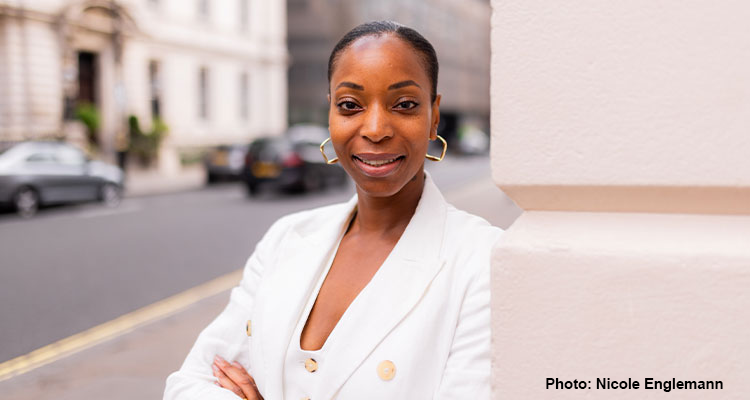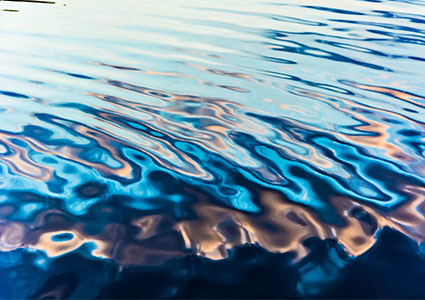Natalie Campbell of Belu Water shares her passion for changing the way the world sees water
I wanted to be a CEO at 15,” begins Natalie Campbell, Co-CEO of Belu Water (Belu). “My career journey started properly when I went to university and ran my first business, which was a Morgan clothing store. While I was on track for entrepreneurial success, sadly, the franchise owner went into administration. That was my first taste of having a business, building it, becoming successful and then sadly, having to shut it down. Over the years, I’ve held various positions and in 2011, co-founded A Very Good Company (AVGC), a global social innovation agency with a single mission: to create a world where people ‘feel good, do good and live better’.
“We put purpose, sustainability, and inclusion at the heart of our work long before it was the thing to do. We worked with businesses like Marks & Spencer, Virgin Media, and Channel 4, challenging our clients to put people and the environment first. We were proud disruptors of ‘business as usual’.
“When I saw the role at Belu, I jumped at the chance. I thought I was inheriting a six-million-pound turnover business with millions in profits going to WaterAid, but three weeks into joining the company, the pandemic hit and sales pretty much flatlined to zero. Consequently, we spent that year during the pandemic reorganizing the business and thinking about what Belu could become over the next ten years, to continue purposeful growth and change lives as a result,” Natalie shares.
Doing differently
Belu is a drinks business that thinks differently. It is a social enterprise that invests 100 percent of its profit in pursuit of its purpose: to change the way the world sees water. In fact, Belu has given £5.8 million to WaterAid since 2011 to help do just that, investing in bringing clean water, decent toilets and hygiene education to the world’s poorest communities. The organization is one of the UK’s best-known social enterprises serving the UK hotel, restaurant, and catering sectors to fulfil their water requirements with the lowest carbon footprint possible.
Incorporated by Reed Paget in 2002, in 2007, Belu was officially launched as an environmental social enterprise. Karen Lynch led the business from 2010, securing a national network of customers, making the company a respected name in the hospitality industry. Natalie took over the helm in 2020, and in September of that year invited Charlotte Harrington, then COO, to join her as Co-CEO to scale filtration and take Belu to new territories outside of the UK.
An innovative, successful and sustainable business, Belu has delivered an incredible social impact and many ‘firsts’, such as moving all lines to 100-percent rPET in 2019, and launching ethical glass to bring the lightest weight UK made glass for mineral water bottles to market since 2014. These initiatives, combined with its highly innovative water filtration systems, have led Belu to build a reputation as a small business with a huge impact.
“It’s as important to us now as it was originally to demonstrate that there is absolutely a different way to do business. Our shareholders forgo their annual returns because they believe that we should be investing in people and the environment, and we’re broadening our purpose to change the way the world sees water. Every business has a choice; profit from society with no give-back or invest profits in putting the environment first and transforming lives. For Belu it is not a choice, it is simply who we are.”
Performance and purpose 
In 2021, Belu made the decision to move away from opaque carbon offsetting initiatives and instead chose to redirect funding to invest in nature-based solutions in and around the UK. Committed to doing the right thing through its climate and environmental efforts, Belu is raising awareness and empowering the hospitality sector with the best equipment, service and knowledge to minimize and reduce industry emissions and reinvest in sustainable initiatives for UK rivers, canals, waterways and coastlines.
Many businesses in the food and beverage sector struggle to balance profitability with sustainability, but every business has a choice whether to invest in putting the environment first and in transforming lives. “If I’m being honest,” Natalie explains, “I do get frustrated when I hear businesses, whether that’s restaurants, bars or hotels, asserting that they prioritize sustainability and provenance, when very often, the only priority is price. The two just don’t go together. You can’t buy a British-made product cheaper than those made overseas. That’s the reality. So, in our industry, we’re up against competitors who ship their bottles in from overseas or bottle completely outside of the UK. While that approach is cheaper, we know it’s not better for the environment.
“Businesses that care are the ones that go the distance,” Natalie asserts. “Many brands have tried to enter the drinks market by making unsubstantiated sustainability claims. Brands that try to penetrate the market with the lowest prices don’t last because investing in and caring about the provenance of a product really makes the difference. We have amazing relationships with our supply chain and our customers. So, even when there are other brands cheaper than us, trying to take market share, most of our customers can’t be swayed and are committed to Belu because they know what we do, understand our mission and are invested in our ethos.
“We’re not a massively expensive product in relation to the rest of the market, but when we enter new partnerships, we tend not to focus on the short term, but rather on how we can be a supply partner and help customers on their sustainability journey. That’s how and why we embarked on our filtration business; it was in direct response to customer requirements. Not all businesses would start another business that cannibalizes their core product, but we did it because it’s the environmentally responsible thing to do and the direction in which more groups are heading. Indeed, we went on a transformation journey with one of our legacy customers, rolling out filtration across their estate, understanding alongside them how to scale across all their sites.”
Belu is committed to transparency when it comes to its sustainability strategy, tracking performance against purpose and working on its journey towards a zero-carbon future. As such, the company has been working with Climate Partner to map out exactly what it needs to do to get there. “Our British mineral water,” Natalie continues, “is bottled at source in UK-made glass. The bottles are light weight, made using a minimum of 40 percent recycled content and are 100 percent recyclable. Traditional glass bottles are heavy, meaning they have a higher than necessary carbon footprint. By using lighter bottles we’re using less raw material and generating fewer emissions during transportation. In partnership with Encirc, we’ve created bottles that are industry leading in terms of sustainability. Additionally, Encirc is continuing with its plans to decarbonize its furnaces, which is essential for reducing its Scope 1, and in turn, our Scope 3 emissions, from glass production.”
Water stewardship
Belu is lucky to have a supply chain made up of companies that understand its aims and support it in its purpose. Likewise, it continues to welcome a wonderfully varied collection of restaurants, hotels, and workplaces to the Belu Collective. In 2023, 96 likeminded new partners joined Belu. “We partner with companies that care. From a luxury perspective, it really comes down to storytelling, quality, and understanding the supply chain. Companies need to champion the brands, suppliers, and partners they work with to demonstrate they are doing the right thing. I don’t think any chef, for example, who believes in the quality of their cooking, would purchase poor produce. It’s the same whether it’s a matter of wine or water. Luxury companies want the best they can afford and should nurture supplier relationships to demonstrate a genuine understanding of provenance.
“Storytelling is increasingly becoming a differentiator when it comes to a luxury brand actually acting in a sustainable way versus a luxury brand that’s merely prioritizing a price point. This isn’t just about the water we drink, it’s how we think about water, and from a resource perspective, how we go about protecting it. Water stewardship is an essential Scope 3 consideration,” she concludes, “and fortunately, one of the reasons we’ve seen our highest revenue to date is because increasing numbers of customers are seeing the value of water stewardship. Our products are industry leading. More customers have been choosing to serve our UK mineral water, mixers and filtered water because of our sustainability credentials, social enterprise model and our customer-focused service. We all need water. It is so easy to take it for granted but we need to take a moment to notice it, appreciate it and consider life without it. It’s crucial to take small steps towards using a little bit less and to put practices in place at work and at home to conserve it. Supporting the organizations who are already experts at taking care of it and the charities that ensure it safely reaches the people without it, means ‘changing the way the world sees water’ is not an impossible dream.”

